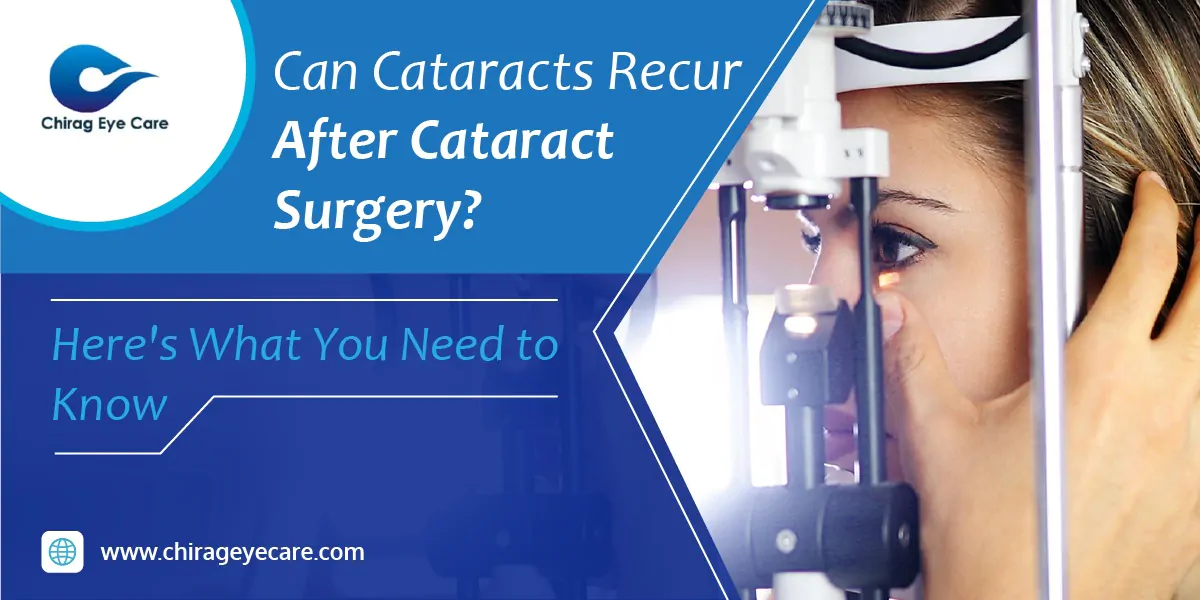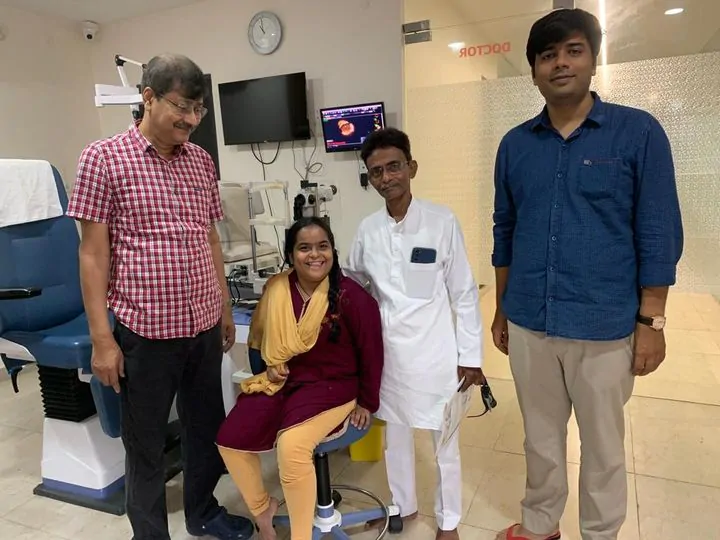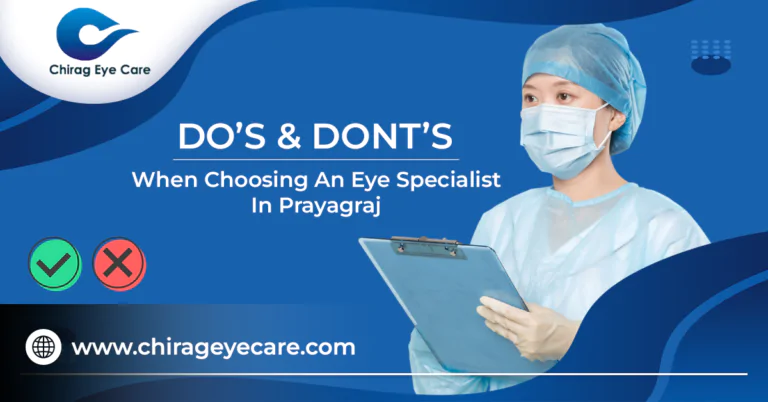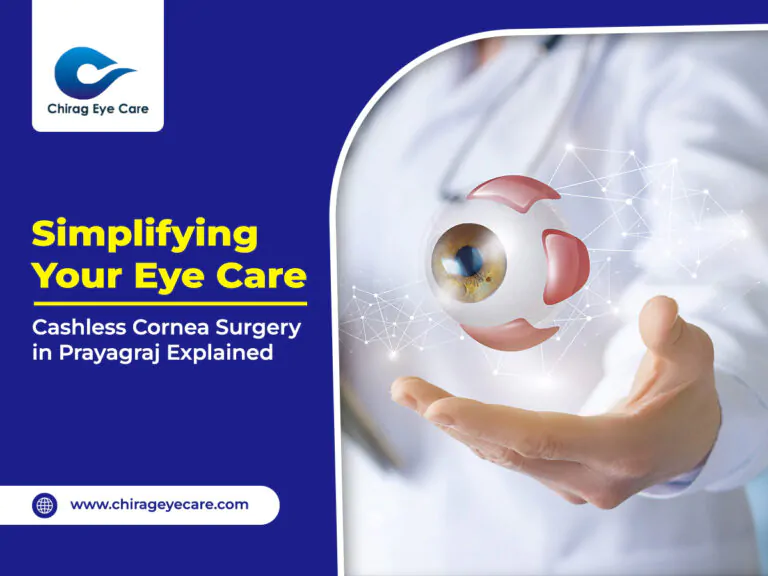Can Cataracts Recur After Cataract Surgery? Here’s What You Need to Know
Are you struggling with blurred vision and planning to have cataract surgery as prescribed by your doctor, followed by eye examinations? But one question keeps lingering in your mind, holding you back from making a decision or confusing you regarding the success rates.
Don’t worry, you’re not alone. Many people with cataracts are seeking answers to this question. Let’s clear up these doubts and bring a light of hope, with the help of the ophthalmologists at the best eye hospital in Prayagraj, Chirag Eye Care.
Cataracts Explained
A cataract is an eye condition that leads to a decrease in vision due to the clouding of the eye’s natural lens. The eye lens is a clear and flexible part of the eye, located behind the iris, the colorful part of the eye. It helps focus light on the retina, which sends electrical signals to the brain through the optic nerve, creating the image that we see. Cataracts become a significant issue when performing regular tasks, such as reading, cooking, etc., becomes difficult.
Why Do Cataracts Occur?
Basically, cataracts occur due to a common issue—aging. However, the eye experts at the best eye hospital in Prayagraj say that certain other factors contribute to the occurrence of cataracts. Let’s take a look at them, starting with the common factor—aging.
- Aging
As we start getting older, typically around the age of 40 or beyond, the natural lens begins to break down. The proteins in the lens start to break down and group together, causing the eye lens to become cloudy.
- Genetics
Like many diseases, cataracts can also be genetic. If a family member has a history of cataracts, you may be at a higher risk. In some cases, people are born with cataracts or develop them at an early age.
- Eye Injury or Surgery
Certain eye surgeries, such as retina surgery, involve incisions that may leave scars. These scars can cause the lens to become cloudy, leading to the development of cataracts.
- Medical Conditions
Diabetes: When sugar levels increase, the lens of the eye absorbs the sugar, leading to swelling and fluid buildup in the lens.
Hypertension (high blood pressure): When blood pressure increases, it can damage the blood vessels, affecting blood flow to the lens, which impairs its ability to maintain clarity.
- Medications
Prolonged use of medications to treat conditions such as asthma or arthritis can contribute to cataract development.
- Lifestyle Habits
Excessive smoking and alcohol consumption increase the risk of cataracts, as the chemicals in these substances affect the lenses of the eyes.
A poor diet lacking nutrients, especially vitamins A, C, and E, can weaken the eyes internally. Additionally, not wearing sunglasses to protect your eyes from harmful UV rays can also increase the risk of cataract formation.
Cataract Surgery: A Treatment Option
Cataract surgery is an effective treatment option for people diagnosed with cataracts in one or both eyes. Medication in the form of eye drops does not remove cataracts; it only mitigates the effects if diagnosed early and does not cause significant disruption in daily tasks. However, if the severity increases, the need for cataract surgery arises mandatorily. Surgery becomes the only solution to restore vision.
Micro-Phaco Cataract Surgery is one of the most effective treatment options. It is a minimally invasive procedure that involves removing the cloudy lens and replacing it with a clear artificial intraocular lens (IOL). The ultrasound technique is used to break the lens, meaning no needle is inserted. Local anesthesia is administered to ensure the patient feels no discomfort during the surgery.
This is how a patient experiences a painless and speedy surgical process, typically lasting no more than 15 minutes. The minimal invasion results in less damage, making it easier for the eyes to heal and leading to clearer vision more quickly.
Choose a hospital equipped with advanced technology, such as Chirag Eye Care, the best eye hospital in Prayagraj, to increase the chances of success and minimize complications.
Blurry Vision After Cataract Surgery: What You Need to Know
It is common to experience blurry vision after cataract surgery as your eyes take time to heal and adjust to the new artificial lens (IOL). You may also notice some swelling, which reduces over time, causing a slight delay in achieving clear vision. However, if the blurry vision persists for two to three weeks and does not improve, it’s important to consult your eye specialist.
Possible reasons, as shared by specialists of cataract surgery in Prayagraj, include inflammation, infection, or the development of a secondary cataract.
A secondary cataract, also known as posterior capsular opacification (PCO), occurs when the clear membrane that holds the new artificial lens becomes cloudy after the natural eye lens is removed during surgery, causing blurry vision.
Cataract Surgery Hospital in Prayagraj is achieving exceptional outcomes in such situations, offering treatable solutions and restoring the vision of many. Always ensure your eye hospital has well-experienced ophthalmologists you can trust with your vision.
Your Path to Clear Vision Begins Here
Yes, cataracts are vision blockers, but what if you could simply remove them, like a drop of water from your finger? It’s that easy.
Many people become scared due to misconceptions about cataract surgery and myths passed along by others. What they often lack is consultation with an eye doctor who specializes in eye care and is highly proficient in the field.
Some are also concerned about secondary cataracts, which are often misinterpreted as new cataracts. In reality, secondary cataracts are a medical challenge that can be easily addressed by a specialist ophthalmologist, like those at the best eye hospital in Prayagraj.
So, relax and get ready to walk the path to clear vision. Schedule an appointment with Chirag Eye Care to clear all your doubts and open the door to clear sight with confidence.







